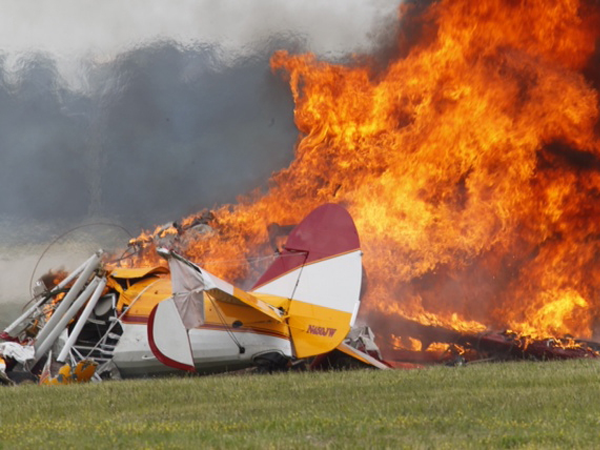US air show resumes after stuntwoman, pilot die

Flames erupt from a plane after it crashed at the Vectren Air Show at the airport in Dayton, Ohio, on Saturday, June 22, 2013. The crash killed the pilot and stunt walker on the plane instantly, authorities said. AP/Dayton Daily News, Ty Greenlees
CINCINNATI – An air show in southwestern Ohio reopened with a moment of silence Sunday, a day after a pilot and wing walker died in a horrifying, fiery crash in front of thousands of spectators.
The Vectren Air Show near Dayton, which closed right after Saturday’s crash, resumed Sunday in honor of pilot Charlie Schwenker and veteran stuntwoman Jane Wicker, both of Virginia.
“As a pilot, you accept the fact that accidents do happen — it’s an accepted risk we take,” said John King, president of the Flying Circus Airshow, which had trained Wicker.
“They were both dedicated to flying and the act. They were true, ultimate professionals,” King said. “I don’t know of anyone who could have done any better than what they were doing.”
Wicker and Schwenker were killed when their plane crashed suddenly in front of spectators who screamed in shock as the aircraft quickly was engulfed in flames. No one else was hurt.
Article continues after this advertisementVideo of the crash showed their plane gliding through the sky before abruptly rolling over, crashing and exploding into flames. Wicker, performing at the Dayton show for the first time, had been sitting atop the 450 HP Stearmans biplane.
Article continues after this advertisementThe decision to resume the show a day after the crash was an emotional one supported by Wicker’s ex-husband, said air show general manager Brenda Kerfoot.
“He said, ‘This is what Jane and Charlie would have wanted,'” Kerfoot said. “‘They want you to have a safe show and go out there and do what you do best.'”
Wicker, 44, who lived in Bristow, Virginia, was a mother of two boys and engaged to be married, Kerfoot said.
“She was a well-rounded, delightful woman who was passionate about aviation,” said Kerfoot. “She was in the business for a very long time and was well-loved by the air show community; she would certainly have wanted the show to go on.”
Schwenker, 64, of Oakton, Virginia, was married.
The cause of the crash is unclear and the conclusion of an investigation by the National Transportation Safety Board likely will take months. The NTSB planned a news conference later Sunday to discuss the accident.
Wicker’s website says she responded to a classified ad from the Flying Circus Airshow in Bealeton, Virginia, in 1990, for a wing-walking position, thinking it would be fun. She was a contract employee who worked as a Federal Aviation Administration budget analyst, the FAA said.
In one post on Wicker’s site, the stuntwoman explains what she loved most about her job.
“There is nothing that feels more exhilarating or freer to me than the wind and sky rushing by me as the earth rolls around my head,” the post says. “I’m alive up there. To soar like a bird and touch the sky puts me in a place where I feel I totally belong. It’s the only thing I’ve done that I’ve never questioned, never hesitated about and always felt was my destiny.”
She also answered a question she said she got frequently: What about the risk?
“I feel safer on the wing of my airplane than I do driving to the airport,” she wrote. “Why? Because I’m in control of those risks and not at the mercy of those other drivers.”
A program for the air show touted Wicker as a performer of “heart-stopping” feats who did moves that “no other wing walker is brave enough to try.”
“Wing riding is not for this damsel; her wing walking style is the real thing,” the program said. “With no safety line and no parachute, Jane amazes the crowd by climbing, walking, and hanging all over her beautiful … aircraft.
“Spectators are sure to gasp as this daredevil demonstrates in true form the unbelievable art of wing walking,” it says.
On the video of the crash, an announcer narrates as Wicker’s plane glides through the air.
“Keep an eye on Jane. Keep an eye on Charlie. Watch this! Jane Wicker, sitting on top of the world,” the announcer said, right before the plane makes a quick turn and nosedive.
Some spectators said they knew something was wrong because the plane was flying low and slow.
Thanh Tran, of Fairfield, Ohio, said he could see a look of concern on Wicker’s face just before the plane went down.
“She looked very scared,” he said. “Then the airplane crashed on the ground. After that, it was terrible, man … very terrible.”
In 2011, wing walker Todd Green fell 200 feet (60 meters) to his death at an air show in Michigan while performing a stunt in which he grabbed the skid of a helicopter.
In 2007, veteran stunt pilot Jim LeRoy was killed at the Dayton show when his biplane slammed into the runway while performing loop-to-loops and caught fire.
Organizers were presenting a trimmed-down show and expected smaller crowds at Dayton after the Air Force Thunderbirds and other military participants pulled out this year because of federal budget cuts.
The air show, one of the oldest in the U.S., usually draws around 70,000 people and has a $3.2 million impact on the local economy. Without military aircraft and support, the show expected attendance to be off 30 percent or more.
Still, King said, in the four decades since Flying Circus started, many kids have been so inspired watching the show that they later became military and commercial pilots.
“Our show takes them back to the barnstorming era of air shows,” he said. “It’s amazing how many people have taken up aviation careers because of their first exposure to the Flying Circus.”